Cliff Hays's Blog
February 17, 2025
Epistemology and Philosophy of Science
For me, epistemology resides at the heart of everything philosophical, because to question knowledge is to inevitably reveal the inherent complexity of appearance, perception, and reality. And philosophy of science is the most vital epistemological extension, because it concerns a shared reality between individuals that appears to be objectively certain.
Nothing philosophical exists in a vacuum, however. Questions of epistemology may involve ethical dilemmas like the trolley problem or the problem of evil, metaphysical conundrums like the existence of a higher power, perplexing mathematical-logical phenomena like different sized infinities or verification asymmetry, or even the supremely subjective mystery of the self.
In fact, the self is a great place for epistemology to begin. Some believe that Descartes' dubito ergo cogito ergo sum (I doubt therefore I think therefore I exist) proves the existence of the self, for how could anything be doubting and ergo thinking if that thing didn't exist? Others argue that the 'I' is presupposed in Descartes' formula, and therefore nothing is proved. Personally I'm in the former camp, because it seems that the objection is invalid due to it shooting itself in the foot; I mean, who is it that is objecting if the objector is nonexistent?
But the previous paragraph is conflating epistemological modes of relating to reality. If something is actually proven, in the sense of it being logically deduced from well-defined axioms and rules of inference, then it is known, and there is no need or possibility of believing it. Bare physical facts are also known, like 'the Sun rises in the east.' As long as the terms in the sentence (formula) are well-defined (Sun, rises, east), we can determine its truth or falsity via observation.

Portraits of Descartes and Kierkegaard
These things Kierkegaard would have called 'objects of knowledge,' for it is truly possible for us to know them. Then in contrast to objects of knowledge he distinguished 'objects of faith,' which, due to their objective uncertainty, are not knowable in that way. The thing of concern earlier − the self − falls squarely into the objects of faith. There is no way of observing the self directly, neither our own nor anyone else's, even though the behavior of biological (physical) bodies seems to intimate (hint at) the existence of selves. It is just as valid to believe in selves as it is to believe that we're merely 'bundles of vague sensory perceptions with names' (cf. Adams).
What Descartes gives us then in his first two Meditations is not a proof, but rather a justification for a belief.
But beliefs need not even have justifications, since they involve that which is objectively uncertain anyway and not given to logical deduction. All one really needs is a leap (another Kierkegaardian insight); but according to Kierkegaard, it is not despite a lack of reason that a belief becomes a leap, but rather the very unreasonableness or absurdity of an object of faith that necessitates a leap being precisely the form in which a belief can come into existence at all.
Scientific ideas, which move beyond mere empirical observation, interestingly straddle the boundary between objects of knowledge and objects of faith. But they are markedly different from beliefs in that they are subject to modification or abandonment if they are falsified or not corroborated, whereas beliefs can be held fast − as they are − regardless of any new observational data. Douglas Adams put it very succinctly by saying that beliefs are essentially unattackable (sacred), whereas scientific ideas are meant to be attacked.
Karl Popper's falsifiability criterion of scientific theories bears semblance to Adams' attackability distinction: "a theory which is not refutable by any conceivable event is nonscientific" (cf. Conjectures and Refutations); and so any attempt at falsification of a theory which fails actually strengthens that theory by corroborating it.
For that reason, it would behoove us to have a falsification institute of sorts, whose task it was to try falsifying anything claiming to be scientific knowledge. Such an institute would serve to advance science faster via inadvertent corroboration than any believers in science do via confirmation bias and/or affirming the consequent.
Not surprisingly, those who are devout to the scientific ideas/theories being "attacked" would claim that the institute was against science, but − as shown above − the activity of attempting falsification is assuredly for science.
When it comes down to it, science itself is not about who wins or who is perceived as “right,” it is solely about what is actually true (viz. replicable & corroborated).
Home | Books | Music | Sci-Fi | Works
Published on February 17, 2025 06:59
March 16, 2024
Through Fog by Samantha Preis
Through Fog by Samantha Preis has quickly risen to become one of my all time favorite folk albums.
Her guitar playing is gentle, precise, and hypnotic in a way that creates a feeling of floating. Her sense of melody, harmony, and atmosphere pervades every song [this album has no weak tracks].
As for her vocals, they are perfection: as expressive and soulful as they are captivating. On top of that, her lyrics are wonderful: poetic, clever, at times even philosophical.
With the exception of one string accompaniment and the concluding piano instrumental, the entire album is only Preis' guitar and voice. Upon listening, you will quickly realize that this is all she needs to haunt and transfix.
It surprises me every time I listen to it how an album that seems so calm can be so moving.
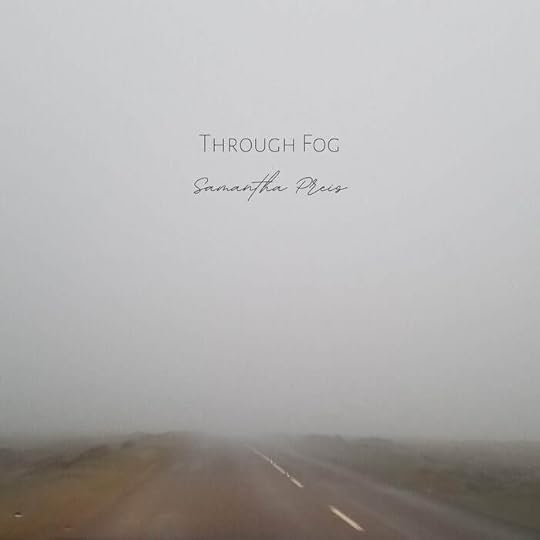
While anyone who enjoys good melody, voice, and atmosphere will probably like this album, IMO it is an absolute must-have for any fans of the folk and/or singer-songwriter genre.
For me it's right up there with the best stuff by Lead Belly, Cat Stevens, Gordon Lightfoot, and Tracy Chapman.
Support the artist at Bandcamp or listen on other services.
Home | Books | Music | Sci-Fi | Works
Published on March 16, 2024 05:22
January 20, 2024
Best Albums of the 1990s
It is obvious that the nineties is one of the best decades of music in existence. For that reason, any list of this sort is inevitably relegated to being (at best) only the tip of one of its many icebergs.
That being said, the selections below are the opinion of one individual, and may or may not correspond to the albums you would have chosen. Knowing that, you may assume an IMO wherever you like, but I will omit them for the sake of brevity and non-repetition.
For me personally, the most important aspects of music (those that draw me to listen and relisten to certain works) are melody, harmony, and I guess what I would call rhythmic texture [the way the mathematico-temporal quality of the individual parts in a piece (be they instrumental or vocal) creates a confluent soundscape].
Melodies can have a life all their own, and be compelling by themselves (think of Behind the Wall by Tracy Chapman); but when voices harmonize, and when instruments harmonize with themselves (via chords) and those chords with the notes & chords of other voices and instruments, what can occur is essentially a sequence of breathtaking harmonic progressions. Songs that create such an effect never get old. So... if − while reading this list − you wonder "Why on Earth did he pick that?!" then it was likely for the melody, harmony, and/or rhythmic texture.
Also note that the lyrical content has no bearing on these selections, because lyrics - for me - are always secondary to the melody they carry & the harmony they facilitate.
The order is chronological by release date & so does not indicate a ranking...
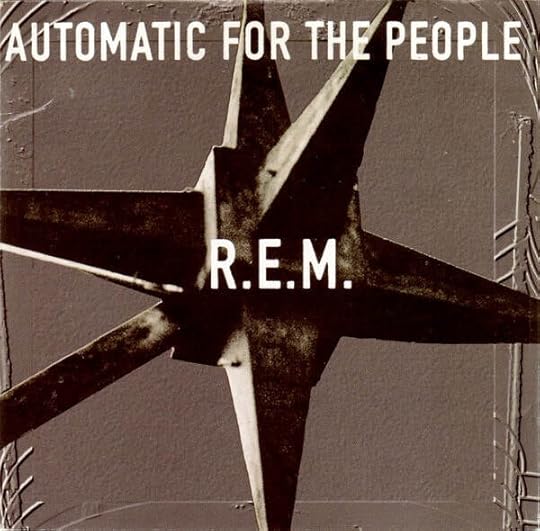 Automatic for the People - R.E.M.10/5/1992
Automatic for the People - R.E.M.10/5/1992This album is an absolute work of art. Even Buck and Mills have said that it's the best R.E.M. record. ~ More so than on any of their other albums, the songs on this one seem to be atmospherically unified, each one adding another somber beautiful dimension to the work as a whole.
Favorite segment: tracks 6 − 9
Favorite tracks: Sweetness Follows, Ignoreland
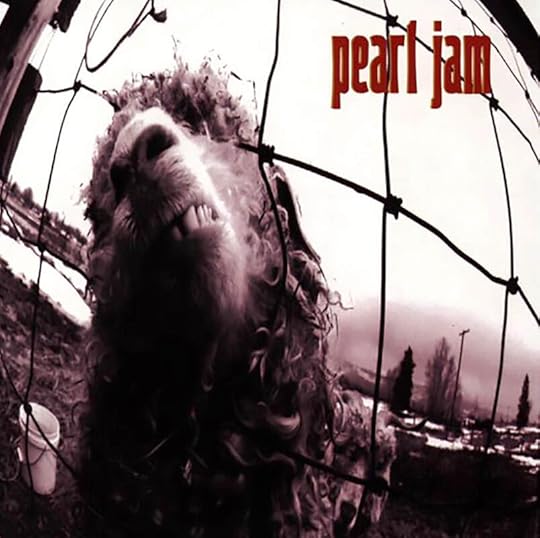 Vs. - Pearl Jam10/19/1993
Vs. - Pearl Jam10/19/1993This is the quintessential grunge album, with songwriting as good as or better than Ten & the intensity turned up a notch. Vs. is interlaced with the energy of punk and the heaviness of metal, and is their first album with the best drummer they ever had, Dave Abruzzese. Even Ament has said, "I wish our first record sounded like this."
Favorite segment: tracks 8 − 11
Favorite tracks: Dissident, Leash
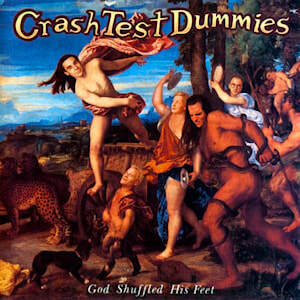 God Shuffled His Feet - Crash Test Dummies10/26/1993
God Shuffled His Feet - Crash Test Dummies10/26/1993Some may view CTD as a novelty band, but they're actually extremely talented musicians with a great sense of humor; not to mention Roberts' striking baritone vocals as they meld with Reid's frequent angelic harmonizations. If you listen closely, the precision and creativity of the rhythm section might surprise you as well. Roberts' brother Dan writes spot-on basslines (often with melodies of their own) & Dorge's drumming always expertly compliments the songs while achieving a perfect fusion with the basslines. ~ Severely underrated, this album exhibits a cleverness and coherence that stands the test of time.
Favorite segment: tracks 1 − 6
Favorite track: In the Days of the Caveman
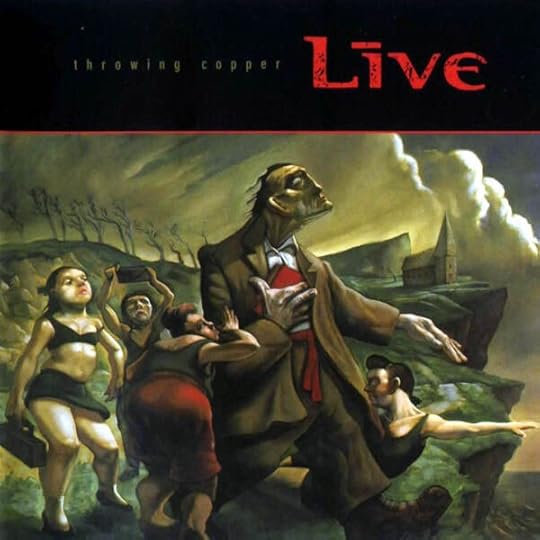 Throwing Copper - Līve4/26/1994
Throwing Copper - Līve4/26/1994I think in 1994 I probably listened to this album more than any other. It frequently oscillates between calmness and intensity (being basically the pinnacle of the quiet-verse-loud-chorus paradigm), has many epic moments, and is packed with compelling melodies and dynamic bridges. ~ Iris and Top are without a doubt my favorite Līve songs, which is funny because in the tracklist they are literally surrounded by "hits."
Favorite segment: tracks 8 − 11
Favorite tracks: Iris, Top
With Līve's Throwing Copper, a pattern starts to emerge in this list, because the two albums that preceded it − Pearl Jam's Vs. and Crash Test Dummies' God Shuffled His Feet − are not only the best albums from those bands, but are also their second albums. ~ This is a pattern that will (unintentionally) continue to be prominent; and it may be the case that one of the most annoying epithets used by music critics ("sophomore effort") in actuality refers to many a bands' magnum opi.
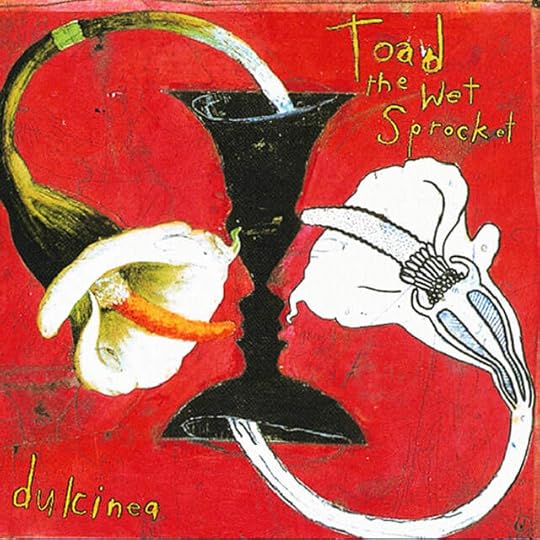 Dulcinea - Toad the Wet Sprocket5/24/1994
Dulcinea - Toad the Wet Sprocket5/24/1994The way I feel about this album is similar to how I feel about Automatic for the People. An incredibly talented band, at the height of their powers, not overthinking or forcing anything, just being themselves and playing together in a strikingly cohesive way, creating a unified atmosphere among the songs that is more somber and serious than usual, but which is nevertheless mesmerizing; and as with R.E.M.'s masterpiece, Dulcinea exhibits a beautiful dreamlike quality that is so strong it is like a world unto itself.
Favorite segment: tracks 1 − 5
Favorite tracks: Crowing, Inside
 Purple (紫) - Stone Temple Pilots6/7/1994
Purple (紫) - Stone Temple Pilots6/7/1994I am hesitant to call this a grunge album, because to me it sounds very little like Pearl Jam, Soundgarden, or Nirvana. Of course music critics falsely accused STP of copying the sound of those others [music critics didn't like Master of Reality either, so what do they know?]; anyway, Weiland, the DeLeo brothers, & Kretz to me always wrote music/lyrics that were more along the strange/poetic lines rather than angered/tormented. ~ On Purple, STP are a well-oiled rock machine spewing forth some of the finest harmonies & rhythmic textures possible atop a foundation of distorted guitars & melodic basslines.
Favorite segment: tracks 7 − 10
Favorite track: Silvergun Superman
(the fourth second album that is the artist's best)
 Villains - The Verve Pipe3/26/1996
Villains - The Verve Pipe3/26/1996Although I avoided ranking these albums because they're all so good, I believe I can say with certainty that this second album by The Verve Pipe is probably my favorite album of the 1990s. The reason I believe that is because of all of these albums, this is the one I relisten to the most. ~ Interestingly, the biggest "hit" is its worst track (I skip it every time); the other weak song is actually the titular track. ~ Despite the odd fact that there are two weak tracks on here, the rest of it is utterly phenomenal. Passionate, heavy, quiet, beautiful, strange, moving ... these are some of the terms that come to mind when I try to describe it. Of the three most important musical aspects, Villains is a treasure trove. All I can say is: make a playlist of its songs minus tracks 3 & 7, put on some headphones, and experience the apex of nineties alternative rock.
Favorite segment: tracks 4 − 9 (minus 7)
Favorite tracks: Myself, Ominous Man
(the fifth second album that is the artist's best)
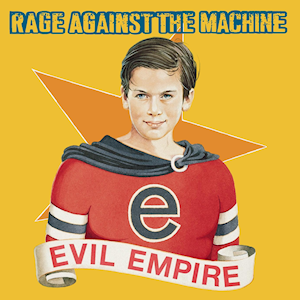 Evil Empire - Rage Against the Machine4/16/1996
Evil Empire - Rage Against the Machine4/16/1996While their self-titled debut is obviously awesome, for me Evil Empire has greater intensity, tighter playing, and feels heavier and more brutal (in the satisfying way that metal is brutal) as a result. ~ Every member of the band contributes equally to the impressive rhythmic textures created: stopping and starting on a dime for every tiny detail, incorporating syncopation and hesitation, and listening to each other well so their parts end up being interwoven rather than separate. ~ It is definitely a work of art to feast your mind upon.
Favorite segment: tracks 3 − 8
Favorite tracks: Vietnow, Without a Face
(the sixth second album that is the artist's best)
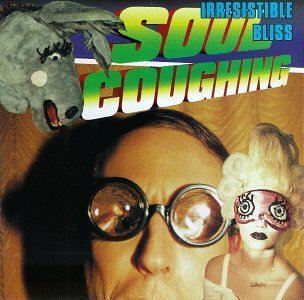 Irresistible Bliss - Soul Coughing7/9/1996
Irresistible Bliss - Soul Coughing7/9/1996One of the most interesting bands to come out of the nineties, Soul Coughing created a completely unique sound by fusing alternative rock, jazz, hip hop, & electronic; and although I'm usually not concerned with lyrics, Mike Doughty writes some of the most entertaining around.
Beyond their unusual fusion, a lot of the uniqueness in their sound comes from their very specific talents & choices of instrument(s): Yuval Gabay's drumming is a hypnotic jazzy precision mixed with bouncy hip hop [beat] machinery; Sebastian Steinberg's upright bass playing is thumpy & melodic (perfectly complimenting Gabay's drumming); Mark Degli Antoni's keyboarding & sampling adds an extremely captivatingly weird atmosphere to the music [with choices that are unpredictable but always fitting]; lastly, Doughty is a chill guitar player & skilled melodist with a penchant for stream-of-consciousness poetry [bordering on spoken word at times].
Favorite segment: tracks 2 − 6
Favorite tracks: Soft Serve, Soundtrack to Mary
(the seventh second album that is the artist's best)
* * *
If you like this album, definitely check out their other two
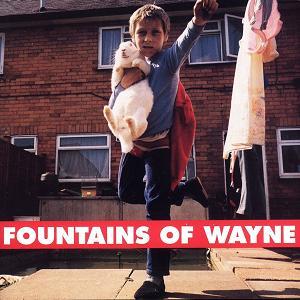 Fountains of Wayne (self-titled)10/1/1996
Fountains of Wayne (self-titled)10/1/1996There is a clever simplicity to the material on Fountains of Wayne's debut album. The melodies are straightforward and strong, the lyrics are hilarious, and the choruses are big and catchy (catchy in the infectious way, not the annoying way).
Favorite segment: tracks 1 − 6
Favorite tracks: Survival Car, Leave the Biker
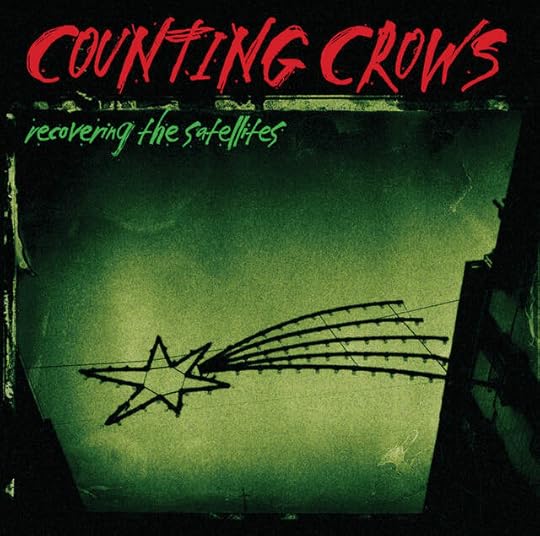 Recovering the Satellites
Recovering the SatellitesCounting Crows10/15/1996
Counting Crows' second album is lighter in mood but heavier in sound than their debut. The drumming style of Ben Mize is more energetic with more symbol work than their original drummer, which gives the album a more opened-up feel (less choppy). ~ Unlike the highly-effective sadness of August and Everything After, there is a pervasive hopefulness to the songs of Recovering the Satellites: minor chords mingling with strange notes more often than just with other sad [t]ones.
Favorite segment: tracks 4 − 6
Favorite tracks: Children in Bloom, Miller's Angels
(the eighth second album that is the artist's best)
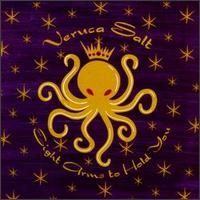 Eight Arms to Hold You
Eight Arms to Hold YouVeruca Salt2/11/1997
This album rocks! Chock-full of awesome melodies, harmonies, guitar riffs, & an overall great energy, it is without a doubt superior to its predecessor. ~ I revisit this one almost as often as I do The Verve Pipe's Villains.
Favorite segment: tracks 10 − 13
Favorite tracks: Don't Make Me Prove It, One Last Time
(the ninth second album that is the artist's best)
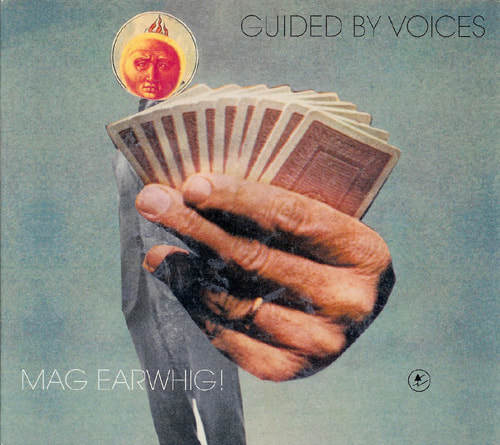 Mag Earwhig! - Guided By Voices5/20/1997
Mag Earwhig! - Guided By Voices5/20/1997You'll hear a lot about this album being their sell-out hi-fi album after the so-called "classic" line-up left, but don't believe the negative hype. As far as I'm concerned there is only one member in the classic line-up: Robert Pollard himself; and this is the first album he made with lead guitarist / multi-instrumentalist Doug Gillard!
The tracks on here range from the wonderfully odd (The Old Grunt, Are You Faster?, Hollow Cheek) to arena rockers (I Am a Tree, Not Behind the Fighter Jet, Little Lines) to the sad and beautiful (Learning to Hunt, Now To War).
Favorite segment: tracks 16 − 18
Favorite tracks: Learning to Hunt, Jane of the Waking Universe
* * *
...and if you needmore songs after Mag Earwhig! be sure to check out the Guide to Guided By Voices
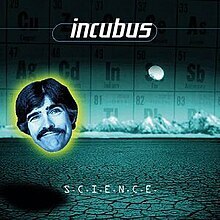 S.C.I.E.N.C.E. - Incubus9/9/1997
S.C.I.E.N.C.E. - Incubus9/9/1997Before Incubus morphed and became unlistenable to me [albeit more popular], they dropped one of the heaviest & wildest albums in existence.
S.C.I.E.N.C.E. somehow successfully fuses metal, funk, & rap (a fusion that sounds potentially atrocious in theory, but in their highly skilled hands ends up working perfectly) [not only that, amidst the impressive technicality, compelling melodies & harmonies abound].
Lastly I'll say this: if you think you know what it will sound like because you've heard Drive or Are you in?, think again...
Favorite segment: tracks 1 − 5
Favorite tracks: Nebula, Calgone
(the tenth second album that is the artist's best)
 Music Has the Right to Children
Music Has the Right to ChildrenBoards of Canada4/20/1998
The debut full-length album in the discography of probably the most mesmerizing musical body of work to ever exist, this one must be heard to be misunderstood, & seen with the mind's eye to be disbelieved.
Imagine slowed-down recordings of hypnotic chords, reversed atop infectious beats & transmitted through wormholes into television tubes, emanating visible echoes of a future past across lightyears of spacetime...
"...until we - ah, look at me. I'm ramblin' again."
Favorite segment: tracks 8 − 13
Favorite tracks: Kaini Industries, Bocuma, Olson
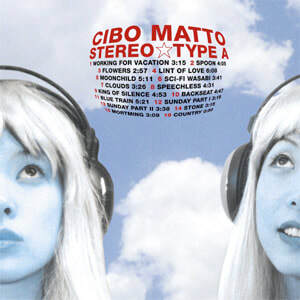 Stereo ★ Type A - Cibo Matto6/8/1999
Stereo ★ Type A - Cibo Matto6/8/1999This album seamlessly fuses many genres and epitomizes the late-90s vibe. ~ Pure joy for the ears & mind, it will satisfy your cravings for alternative rock, funk, hip/trip hop, indie pop, jazz, lounge, etc.
Put sci-fi wasabi on your cosmic stromboli!
(no ravioli, or aioli)
Favorite segment: tracks 4 − 7
Favorite tracks: Sci-Fi Wasabi, Clouds
(the eleventh second album that is the artist's best)
This was an extremely difficult list to make due to the sheer awesomeness of 90s music in general.
Here are some artists that were reluctantly excluded but that are definitely worth checking out if you haven't heard them before: Beth Orton, Ivy, Liz Phair, Luscious Jackson, Phish, Seal, Stereolab, The Corrs, The Cranberries, Tracy Bonham.
And for the record: even though Vs. is my favorite grunge album, my favorite grunge song is not from that album, or even by Pearl Jam. It is in fact Drown by Smashing Pumpkins. Listen to that if you need your brain reset.
Also for the record: sometimes The Verve Pipe's Villains is considered to be their third − not second − album; but in order for that to work you have to consider I've Suffered a Head Injury to be an actual album (which originally it supposedly was), when what it has been widely released as is an 8-song EP. ~ Either way, I believe they hit their 2nd-album stride on Villains, not Pop Smear.
Finally, speaking of the aforementioned 2nd-album stride, eleven out of the sixteen albums in the list are second albums [that's 68.75% of them]. My hypothesis on this unexpected phenomenon is that many (if not most) bands/artists reach the state of knowing what they're doing yet not overthinking it on their second album.
Obviously this isn't true for all artists. Some reach that point much later (R.E.M., Toad the Wet Sprocket) & for some their debut is their best (Doves, Fountains of Wayne, Metric, Tracy Bonham).
* * *
Need more music? Check out Best Albums of the 2000s
Home | Books | Music | Sci-Fi | Works
Published on January 20, 2024 13:23
June 25, 2023
Zero 7 Triple Coincidence
I'm not ordinarily someone who searches for mysticality in everything odd, but last November something strange happened.
It had to do with my iPod shuffler, the subtitles of a TV show, and a job I was interviewing for.
The First Occurrence
I have a playlist of roughly half Cibo Matto songs and half Zero 7 songs that is 90 minutes long, and as I started to take a walk I shuffled the list [starting with a random Zero 7 song].
Since my walk was about 45 minutes, I only got to hear half of the songs. But here’s the strange thing: only Zero 7 songs played during the walk. Not a single Cibo Matto song played until just as I was back at my doorstep.
The Second Occurrence
Then, while I was having breakfast, I sat down for a couple of minutes and was barely paying attention to a TV show that was on, but did notice that one sentence of its subtitles ended in this: “…, zero, seven.”
Beginning to Wonder...
After seeing the subtitle I was kind of flabbergasted. If the shuffler playing only Zero 7 songs wasn’t enough, the subtitles showing those specific words to me the moment I sat down greatly enhanced the strange feeling I had.
The Third Occurrence
So, regarding the job I was interviewing for, I had already made it through a phone screening and two interviews, and on the day of the shuffler & subtitle I was scheduled to have a final panel interview.
Needless to say, I was extremely nervous that morning (probably as nervous as I've ever been). It is not for lack of self-confidence, but rather the fact that so much rides on getting a job: being able to have somewhere to live, food, water, electricity, internet, etcetera.
I read somewhere (can't remember where) that stress increases the perception of coincidences due to the hyperawareness it involves. This seems a pretty reasonable hypothesis given what I was going through and what I noticed.
Anyway, I had the feeling then – and still believe – that the coincidence of the shuffler & subtitle was pointing at my potential new job with a resounding YES; because, as it turns out, roughly 07 hours after the walk, I was offered the job.
* * *
My walk had ended just after 8am, and I ended up getting the job offer just after 3pm.

Photo by @dzeninalukac
Rationalization
One of the interesting aspects of this experience was how I tried to rationalize away the first coincidence while it was happening.
After I had been walking for more than twenty minutes, and every time a new Zero 7 song started playing, my reaction was “No way! A Cibo Matto song will have to play next.” At about 30 minutes I started thinking “Wait a minute, maybe I accidentally selected a different playlist of only Zero 7 songs.” Then at about 40 minutes I thought “Yeah that’s what I must have done,” but then – just as I was literally walking up to the doorstep – a Cibo Matto song started playing.
This too was an interesting experience, because it instantly threw my rationalization out the window.
Then, seven to ten minutes later, the second coincidence occurred... (while I did not actually time this, I am inclined to believe it was closer to seven minutes) ...
Interpretation
Whereas the second occurrence by itself might have gone unnoticed, the fact that it came upon the heels of the first by less than ten minutes caused it major significance.
For me, the first two occurrences together felt like a double coincidence with a very precise meaning: “In 07 hours you will be offered the job.”
Now of course I imbued that meaning with extra optimism by also thinking that the job will be right for me, and that I'll end up liking the job.
Otherwise why would such strange occurrences be pointing to it like that?
Finally, the fact that 07 hours later I actually was offered the job, and now – 07 months later – I actually do like the job, indicates to me that all three occurrences together constitute a meaningful triple coincidence.
Home | Books | Music | Sci-Fi | Works
Published on June 25, 2023 09:06
March 9, 2022
UX Elements That Mess With Your Mind
I'm not talking about bugs here, I'm talking about elements consciously implemented by developers (of software, appliances, packaging, etc.) that cause frustration and confusion.
1. Strikethrough-Eye Password Toggle
 With respect to function and state, this pair of icons is basically a paradox. I mean, does a struckthrough eye mean you can't see the password or you can? Does pressing on a struckthrough eye hide it or show it? Apparently half of people would answer one way and half the other, which is why it is implemented consistently 50% of the time; and everyone is correct in their interpretation. Give me a simple Show/Hide toggle please, for from it − by comparison − function and state are pleasingly obvious.
With respect to function and state, this pair of icons is basically a paradox. I mean, does a struckthrough eye mean you can't see the password or you can? Does pressing on a struckthrough eye hide it or show it? Apparently half of people would answer one way and half the other, which is why it is implemented consistently 50% of the time; and everyone is correct in their interpretation. Give me a simple Show/Hide toggle please, for from it − by comparison − function and state are pleasingly obvious. 2. Dynamic Button Menus
Nothing creates a nicer user experience than a button that runs away (or disappears) when you are trying to press it.
If you have put a menu with dynamic buttons into your app/website, you have implemented the Whac-A-Mole pattern, which is inadvisable. A more impressive pattern by far is the alphabetized grid or list of pressable buttons, which greatly increases menu predictability and navigability.

3. Impatient Micromanagers
I had an appliance one time that − just after you had entered the cook time − would flash PRESS then START at you in quick succession for only a few seconds (maybe 10 or 15) and then just reset to display the clock. I mean, what's the rush? Apparently this appliance needed to get on with whatever it was doing, because it sure wasn't gonna wait around to cook the food.
I get a similar feeling of being rushed and micromanaged from those registration / login form fields that tell you YOU'RE DOING IT WRONG! right out of the gate...

Um... I haven't even begun typing yet, how can I be so wrong already?
I'm all for ensuring properly formatted data is entered into forms, but at least wait until I've left the field to analyze what I've typed [cf. onfocusout].
4. Tear-Here Packaging
Used to be you could open any bag on the top or bottom with a 200% chance of success:

With tear-here packaging you have a mere 10% chance:

Sometimes they print on the bag to tell you where to tear, so you have to scan the bag for something legible before even attempting to open it. Sometimes they don't print anything or print it in microlettering. Good luck...
5. Movement Beside Text

Is it easy to read this text with that tornado bearing down on you?
Moving elements next to text (be they autoplay videos, GIFs, or JS animations) steal your attention away from the words you're trying to read.
* * *
Well that's it for my top five most frustrating or confusing elements of the user experience.
Here are some runners up:
- modern/minimalist info-free websites
- indecipherable icons w/o mouseover hints
- asynchronous ads force page back to top
- default text size like fine print
Home | Books | Music | Sci-Fi | Works
Published on March 09, 2022 17:24
February 21, 2022
The Golden Rule vs Eye for an Eye
It struck me lately how there is a strange similarity between The Golden Rule (TGR) and Eye for an Eye (E4E), and yet they are obviously not identical.
How is the Golden Rule different from Eye for an Eye?
Does following one of them necessarily entail following the other?
At First Glance
Let's take a look at the two rules worded similarly so as to get an initial idea of their relation.
TGR: Treat others how you want to be treated.At first glance each of the rules seems to exhibit a reciprocal structure: whatever I do to/for others I would hope they'd do to/for me, and so if I were to take someone's eye out, I would hope they'd take out mine as well.
E4E: Treat others how they have treated you.
Additionally there is a noticeable semblance to Newton's 3rd Law of Motion:
For every action there is an equal and opposite reaction.But does Newton's 3rd Law really apply to human interaction?
The Difference
Whether the law applies or not, it definitely helps to illuminate a major difference between TGR and E4E.
That is: while TGR is concerned with an individual who is originating action, E4E is concerned with someone who is committed to reaction.
In fact, a follower of E4E could be seen as believing that Newton's 3rd Law does apply to human interaction, and that it is their responsibility to enact something akin to willed karma anytime a wrong is done to them.
Following TGR − on the other hand − does not lock you into any reaction whatsoever, as it only concerns action.

Logical Entailment?
Knowing what we now know about TGR, E4E, action, and reaction, can we now answer the question "does following either rule require following the other?"
Let us say that someone is a staunch believer in E4E, that they are absolutely convinced that any wrongdoer deserves to have equal wrong(s) done to them. What − if anything − does this say about their perspective toward TGR?
Imagine asking them "Why Eye for an Eye?" They could respond with "Treat others how you want to be treated." Almost as if E4E could be seen as a sort of TGR enforcement (AKA willed karma). It seems like if one is a follower of E4E and they have − for the most part − a consistent ethics, then they would also follow TGR.
Not all humans are consistent though, and some have double standards for sure, so maybe they never follow TGR but always follow E4E.
On the flipside, it seems that a true follower of TGR would not mind E4E being inflicted upon them. If they did mind, it would only prove that they were not truly following TGR to begin with. However, this does not mean that they will necessarily enact E4E when given the choice.
Apparently, since TGR concerns action and E4E concerns reaction, neither rule necessarily implies the other. But, the rules are not inconsistent with each other either.
Given all of that, it seems that the most reasonable choice is to follow TGR with or without E4E; and never to follow E4E without TGR because that would be hypocritical.
Home | Books | Music | Sci-Fi | Works
Published on February 21, 2022 10:37
June 20, 2021
Guide to Guided By Voices
With nearly four decades of output, and more than 60 albums, 30 EPs, and 30 side projects to his name, Robert Pollard has without a doubt taken prolificness to a whole new level. And not only has the quantity of his output been amazing, the quality has been amazing as well. In fact, he has so many releases in and around his primary band Guided By Voices (GBV) that there is an entire database dedicated to cataloging them [with song lyrics, musicians, contributors, etcetera].
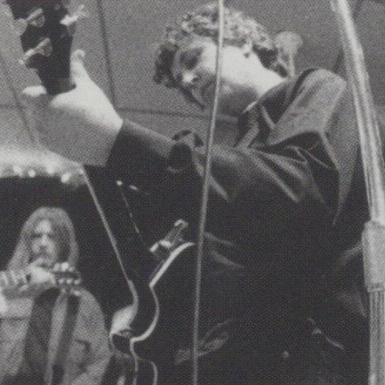
Due to the vastness of their discography, I thought it might be helpful to someone who's curious but has never listened to them before to have a long-time fan's hint about where to begin and why.
First of all, it is the melody and lyrics that make any GBV-related release so special. Fact is, Robert Pollard could write an enthralling melody over the sound of a cat scratching the fence. He is a melody master. And if that were not enough, his lyrics are fantastic: they are surreal, hilarious, serious, poetic, at times stream-of-consciousness, at times chosen solely for their percussiveness, but regardless always evocative of great imagery. And his singing is just as good. He can alter his vocal delivery to portray a wide array of moods and atmospheres. Oftentimes he reminds me of a town crier, with important news for us all (whether we know what he's talking about or not).
So at this point maybe I've convinced you to give GBV a listen. Now the question arises: where to begin?
To answer that, I will start by showing you an image containing my favorite nine GBV-related releases:

The albums in this image span from 1993 to 2003 and contain five official GBV releases, three side project releases, and one solo album.
But which one should you start with?
 I would recommend starting with Mag Earwhig! (1997), not because it is the absolute best here, but because it will allow you to hear the songwriting without any lo-fidelity distractions just yet. While the lo-fi DIY aesthetic never bothered me, it might be a little much at first for ears not used to such things. You'll hear a lot about this album being their sell-out hi-fi album after the so-called "classic" line-up left, but don't believe the negative hype. As far as I'm concerned there is only one member in the classic line-up: Pollard himself; and this is the first album he made with lead guitarist / multi-instrumentalist Doug Gillard! The tracks on here range from the wonderfully odd (The Old Grunt, Are You Faster?, Hollow Cheek) to arena rockers (I Am a Tree, Not Behind the Fighter Jet, Little Lines) to the sad and beautiful (Learning to Hunt, Now To War).
I would recommend starting with Mag Earwhig! (1997), not because it is the absolute best here, but because it will allow you to hear the songwriting without any lo-fidelity distractions just yet. While the lo-fi DIY aesthetic never bothered me, it might be a little much at first for ears not used to such things. You'll hear a lot about this album being their sell-out hi-fi album after the so-called "classic" line-up left, but don't believe the negative hype. As far as I'm concerned there is only one member in the classic line-up: Pollard himself; and this is the first album he made with lead guitarist / multi-instrumentalist Doug Gillard! The tracks on here range from the wonderfully odd (The Old Grunt, Are You Faster?, Hollow Cheek) to arena rockers (I Am a Tree, Not Behind the Fighter Jet, Little Lines) to the sad and beautiful (Learning to Hunt, Now To War).If you've never listened to GBV before, one thing that might strike you as odd is how abruptly some songs end and/or that some songs have no discernable structure. In fact this is one of the greatest things about their music.
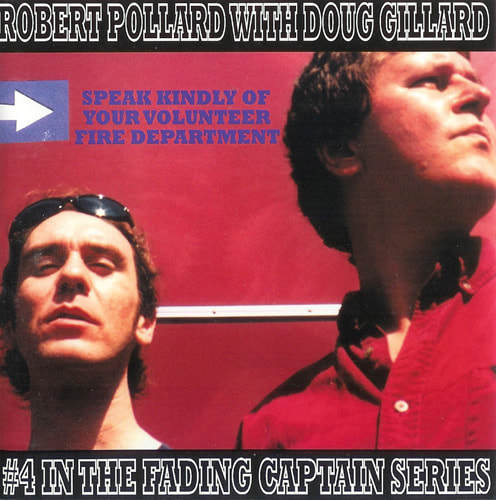 In 1999 Doug Gillard teamed up with Robert Pollard to create one of the finest albums in the entire GBV discography, Speak Kindly of Your Volunteer Fire Department. On this one Gillard wrote and played all instruments while Pollard wrote and sang all lyrics; and as you will find out, Gillard isn't only a great lead guitarist, he is a great piano player, bassist, and drummer too. His style addictively fuses 1970s classic-rock aesthetics with 1990s indie-rock experimentation; and it turns out that his music forms the perfect sonic landscape within which Pollard can unleash some of his best melodies and lyrics.
In 1999 Doug Gillard teamed up with Robert Pollard to create one of the finest albums in the entire GBV discography, Speak Kindly of Your Volunteer Fire Department. On this one Gillard wrote and played all instruments while Pollard wrote and sang all lyrics; and as you will find out, Gillard isn't only a great lead guitarist, he is a great piano player, bassist, and drummer too. His style addictively fuses 1970s classic-rock aesthetics with 1990s indie-rock experimentation; and it turns out that his music forms the perfect sonic landscape within which Pollard can unleash some of his best melodies and lyrics.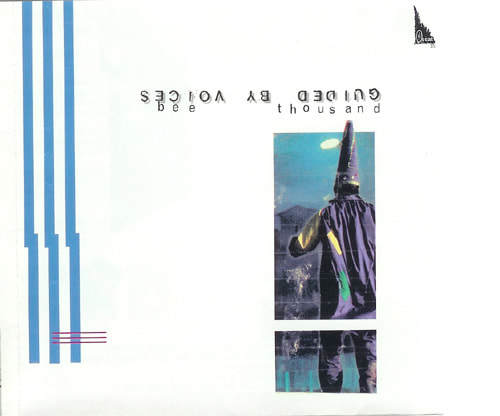 Having been primed on Speak Kindly..., which is slightly lower-fi than Mag Earwhig!, you'll be ready to give a listen to one of the most lauded albums in the entire GBV canon: Bee Thousand (1994). Since there's been so much written about this album I'll just say that all of the praise is justified. It'll probably be one of the most interesting albums you ever hear.
Having been primed on Speak Kindly..., which is slightly lower-fi than Mag Earwhig!, you'll be ready to give a listen to one of the most lauded albums in the entire GBV canon: Bee Thousand (1994). Since there's been so much written about this album I'll just say that all of the praise is justified. It'll probably be one of the most interesting albums you ever hear.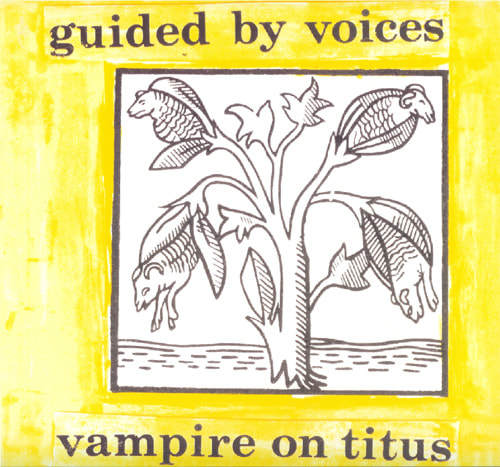 However, it was the year prior to Bee Thousand in which arrived my favorite GBV album of all: Vampire On Titus (1993). Admittedly this is probably one of the lowest fidelity recordings you will hear anywhere, but by this point you should barely even notice anything but the great songwriting. This album is awash in raw emotion, charming strangeness, epic rockers, and overall feels like a magical lo-fi dream. I can't help but think that if more "popular" artists would release some of these songs that they would absolutely dominate the airwaves (i.e. Expecting Brainchild, Sot, Unstable Journey, Perhaps Now The Vultures).
However, it was the year prior to Bee Thousand in which arrived my favorite GBV album of all: Vampire On Titus (1993). Admittedly this is probably one of the lowest fidelity recordings you will hear anywhere, but by this point you should barely even notice anything but the great songwriting. This album is awash in raw emotion, charming strangeness, epic rockers, and overall feels like a magical lo-fi dream. I can't help but think that if more "popular" artists would release some of these songs that they would absolutely dominate the airwaves (i.e. Expecting Brainchild, Sot, Unstable Journey, Perhaps Now The Vultures).
If I had to select one year as my favorite GBV year then it would definitely be 1996, for this was the year of Sunfish Holy Breakfast (EP), Not In My Airforce (solo debut), and Under the Bushes Under the Stars. Sunfish Holy Breakfast is an absolute gem. For me it is very close to Vampire On Titus in its awesomeness. In addition to the many epic Pollard tracks, it starts off with the Tobin Sprout classic Jabberstroker and also includes the James Greer pick-me-up Trendspotter Acrobat.
At this point in the history of GBV there is a slight fork in the road: one way leads down the "official" GBV lane, and the other leads to solo albums and side projects. If you were to listen to all of the official GBV releases from Propeller (1992) through Do The Collapse (1999) you might notice that there is a gradual shift toward the less weird. Not bad - mind you - just less experimental, and perhaps a bit more structured. As Pollard explained in Guided By Voices: A Brief History [speaking in the early 2000s about the early 1990s]:
...at that point all of my efforts went into a GBV record; there weren't all these side projects. So now, the serious sh** goes on a GBV record. The crazy sh** might go on a Circus Devils record or a Robert Pollard record. It's splintered into different projects now...The splintering he mentions is the fork in the road I was speaking of, and it began in 1996 with the release of his debut solo album Not In My Airforce; although − and this is part of what makes 1996 such a great GBV year − the craziness (what I normally refer to as weirdness) at this point was still very much present in the GBV releases as well as the side projects.
All three of the 1996 releases are excellent, but I would listen to Sunfish Holy Breakfast first because it will follow perfectly on the heels of Vampire On Titus; then Not In My Airforce because it is very akin to those two; and finally the more serious / less crazy albeit still weird-enough and ergo awesome Under the Bushes Under the Stars.
If you've gotten to this point, the last two recommendations in my top nine will just be icing on the cake. Mist King Urth (2003) is the phenomenal follow-up to 1999's Speak Kindly of Your Volunteer Fire Department. Officially, Mist King Urth is a release of the side project called Lifeguards, while the 1999 release was by "Robert Pollard With Doug Gillard." Functionally however, it seamlessly continues Gillard's addictive fusion of 1970s classic-rock aesthetics and 1990s indie-rock experimentation with Pollard's beautiful and compelling melodies and lyrics.
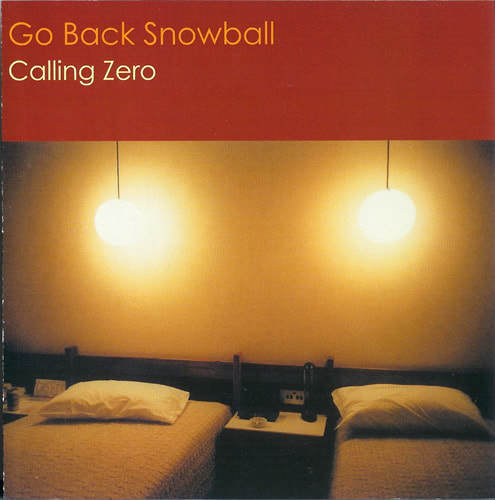 The last recommendation in my top nine is similar to Mist King Urth in that it is Pollard teamed up as vocalist/lyricist with another musician who does all of the music; only this time the musician is Mac McCaughan of Superchunk, the album is Calling Zero (2002), and the side project is Go Back Snowball. Remarkably, McCaughan wrote/recorded all the music on his own, then sent it to Pollard who proceeded to compose some of the greatest melodies and lyrics of his career atop it. You'll be surprised at how different this album feels compared to other Pollard releases due to McCaughan's completely unique approach, but then also amazed at how adeptly Pollard composes fantastically perfect melodies to accompany it.
The last recommendation in my top nine is similar to Mist King Urth in that it is Pollard teamed up as vocalist/lyricist with another musician who does all of the music; only this time the musician is Mac McCaughan of Superchunk, the album is Calling Zero (2002), and the side project is Go Back Snowball. Remarkably, McCaughan wrote/recorded all the music on his own, then sent it to Pollard who proceeded to compose some of the greatest melodies and lyrics of his career atop it. You'll be surprised at how different this album feels compared to other Pollard releases due to McCaughan's completely unique approach, but then also amazed at how adeptly Pollard composes fantastically perfect melodies to accompany it.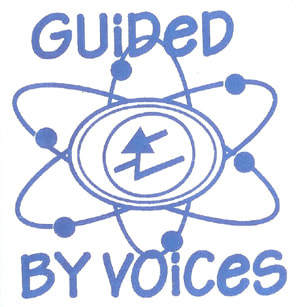
If you needmore songs in the GBV world, with over a hundred releases there always seem to be more.
Here's a quick post-Guide Guide: after Calling Zero I would first go back to Propeller (1992) and then listen to all of the EPs from 1992 to 1996, at which point I would detour into the post-Airforce solo albums (Waved Out, Kid Marine, Motel of Fools) [these are awesome!!!]; and finally retrace your steps back to the late 1990s to hear the hi/mid-fi exploration down the "official" GBV lane, from Do the Collapse onward...
Happy listening!
Home | Books | Music | Sci-Fi | Works
Published on June 20, 2021 07:51
January 31, 2021
Things You Should Know
In 2009 Carina Round released what in my opinion is probably the greatest EP of all time, from which the title and sections of this post get their names. If you've not heard it yet definitely check it out.
Anyway (needless to say) circumstances lately have been horrible, worldwide and personally. I won't dwell on it because there's plenty of doom-and-gloom on the internet already; suffice it to say that in the past month − due to the pandemic − I have lost both a family member and my job.
I realize I am not alone in this, and many others have [had] it much worse. My thoughts and hopes are with all for whom this situation has made the struggle for existence more dire.
1. Backseat
Just a second and we're goneLife is fleeting, we've all heard that cliché. But is it really? Sometimes when we are engulfed in tasks and responsibilities, life seems to drag, and it feels like a fast-forward button would be nice.
Just an imprint when we're done
Could it be true that sometimes life isn't fleeting enough?
And when she says "we're gone" and "we're done" in the lyrics above, what does that mean really?
If we answer with "gone from life" and "done living" this seems only a linguistic or literal completion, since it misses the real gravity of what the words convey.
2. Please Don't Stop
in a carpet made of starsWith regard to the present inquiry, I must stop for a moment to disclose a conflict of interest. Being an individual − or at least believing myself to be − I have always had a very strong feeling that our true selves are not identical with our physical bodies, and therewith that what is going on in someone's mind is infinitely closer to who they are than is the structure or appearance of their body.
I close my eyes and dive in
Obviously I am a dualist at least to a certain extent, although I do not believe that the division between mind and body is as sharp as some would have it [topic for a later discussion].
That being said: the desire to believe in the persistence of individuality after "we're gone" or "we're done" makes the concept of the soul appealing . . . I mean, ultimate survival, right? Able to survive even death!
Imagine the comfort that such a belief might bring...
Apropos, I am in a position to benefit (if indeed the soul does exist as that aspect of an individual which is truly unique and which continues after their physical inanimation) therefore my conclusion on this matter may exhibit unavoidable bias.
3. Thief in the Sky
The storm inside of a heart of concreteThief in the Sky is my favorite song on the EP, and possibly my favorite of all of her songs. In the coda especially, she manages to perfectly capture the feeling of something loved slowly drifting away...
Morning comes around like a thief in disguise
Time like taillights
Always moving away from me
Unrelatedly, it is curious is how often telephonic imagery pops up in this EP and in the follow-up album. In the second verse of this song she sings of a "telephone line," and in the coda she says "telephone wire tie me up." On the EP cover you see her holding a telephone cord and receiver, and then the opening track of Tigermending is called "Pick Up the Phone."
And Things You Should Know doesn't only foreshadow "Pick Up the Phone" via Thief in the Sky, "Pick Up the Phone" also contains the lyrical allusion "The things that you should know are weighing heavy on me" in verse four.
But forgive me for indulging in fandom analyses.
Onto the next track/section/whathaveyou...
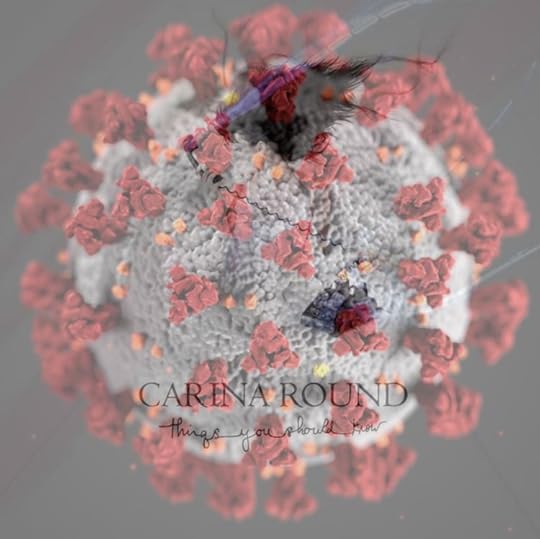
4. Do You
I meant every word I saidBlindsided, scatterbrained, albeit focused (in a scatterbrained sort of way) and hopeful.
From deranged to divine
And I would do it all again
As if for the first time
Back in summer 2017 fantasy author L.E. Henderson wrote a post called Hope, and paranormal sci-fi author Dawn Trowell Jones responded with a post called More Hope; and although the hope with which they were primarily concerned was hope in fiction, their insights undoubtedly have bearing on reality.
From Hope:
To present only darkness without its brighter flip side is no more true-to-life than a belief that life is all glitter and marshmallows.
From More Hope:
Hope’s always present in the sense that every circumstance, no matter how exquisitely cruel, miserable, or depraved, must end.
It is great how the authors have expressed these thoughts in a way which kind of reverses the ordinary way of expressing them.
Permanent negativity is just illogical, because the negative is no more permanent than is the positive. In fact the possibility of one implies the possibility of the other.
5. For Everything a Reason
For every ending a new beginningIt has always been very interesting to me how death is simultaneously the most certain and uncertain thing in existence.
. . .
And those who loved before
will be brought back together
It will happen, we know, but we know not what it is.
One thing is for sure however: whatever it is, it is at least that which is devoid of life; and devoid of life is precisely the state which precedes and gives rise to life. In other words, death is at least a return to the source [that which precedes and gives rise to]. So, while death is indeed unknown, we can at least be certain that it is a nexus to the state in which exists the possibility of life.
This reminds me of Bhagavad Gita 2:27:
Death is inevitable for the living;or of Heraclitus, fragment 66:
birth is inevitable for the dead.
Immortals become mortals,To me it doesn't seem like the speaker in For Everything a Reason is telling us things she knows are true (as much as I would like to believe that when listening to the song); instead it seems like she is telling herself things she hopes are true.
mortals become immortals;
they live in each other’s death
and die in each other’s life.
Maybe that's why the song is so impactful, because you can really feel the hope in her voice, the same hope that you're feeling.
Why do we have this hope?
I think that either our survival instinct is so strong we imagine it extending into that next place, or we are actually aware − albeit unconsciously − of an outcome/plain-of-existence that is truly possible.
* * *
Here is some more Hindu wisdom because I do not know how to end this post (Bhagavad Gita 2:22):
As one abandons worn-out clothes and acquires new ones, so when the body is worn out a new one is acquired by Atman, who lives within.
Home | Books | Music | Sci-Fi | Works
Published on January 31, 2021 08:59
May 24, 2020
Best Albums of the 2000s
It is time to share my favorite albums of our century's first decade, now that we've entered its third decade. Of course, no one person can listen to every album that exists, so in the event there are any glaring omissions in your opinion please share them in the comments. I do not view music as a competition, even though the below list has kind of a competitive organization to it (winners, runners-up); and I have not used any objective measures to rank them, only the fact I have often listened to them repeatedly from start-to-finish [for me their appeal only increases with increased exposure and there are few if any weak tracks] and that they were released between 2000-01-01 and 2009-12-31 inclusive. *Links are to Wikipedia, Discogs, or band websites where possible.
2000
Kid A - Radiohead
RUNNERS-UP
Lost Souls - Doves
Dusty Trails (self-titled)
Long Distance - Ivy
COMMENTS
Although their fourth album, this is the Radiohead release that finally turned my head to them. I remember thinking that a couple of songs from OK Computer were good in the late 1990s, but when I heard Kid A I was stunned and had to own it. Since then I have gotten all of their albums and am definitely a fan.
Boards of Canada's EP In a Beautiful Place out in the Country should be a runner-up here as well.
2001
Toxicity - System of a Down
RUNNERS-UP
Simple Things - Zero 7
Shangri-La Dee Da - Stone Temple Pilots
Melody A.M. - Röyksopp
COMMENTS
Admittedly I did not listen to the SOAD at the time it came out, and I believe that part of the reason was the singles chosen for the album: viz. Chop Suey!, Toxicity, and Aerials. If you've heard the album you know that these three songs barely scratch the surface of what this band can do, and compared to the other tracks on the album they are actually tame. I guess what I love about SOAD the most is their wild unpredictability and sheer brutal heaviness [listen to the first three tracks to see what I mean (Deer Dance blows me away every time)].
Regarding the STP entry, some might be thinking "Shangri-La Dee Da?" Well I happen to think it is one of their most interesting and underrated albums, second only to Purple IMO. Check out tracks 3 (Coma), 6 (Black Again), and 9 (Regeneration) for example.
2002
TWO-WAY TIE
Geogaddi - Boards of Canada
Daybreaker - Beth Orton
RUNNERS-UP
A Rush of Blood to the Head - Coldplay
Steal this Album! - System of a Down
COMMENTS
Yes the SOAD album is edged out here by two of the greatest albums of all time, but if it had been released in '01 or '04 it would have won those years no doubt. Do not believe the rumor that Steal this Album! is a collection of Toxicity outtakes or b-sides. In fact it is a more cohesive and consistent album than Toxicity. It contains probably their finest punk song (A.D.D.), and actually has a virtual "metal suite" in its second half: starting with I-E-A-I-A-I-O, continuing through the highly insightful and ever-inspiring F**k the System, and ending with the awesomely dramatic Streamline.
Imagine if Beethoven listened to nothing but Ride the Lightning for a month and then hit the piano; SOAD's 24 minute F**k the Suite might have resulted.
2003
TWO-WAY TIE
The Disconnection - Carina Round
Hail to the Thief - Radiohead
RUNNERS-UP
Mist King Urth - Lifeguards
Old World Underground, Where Are You Now? - Metric
Tour De France Soundtracks - Kraftwerk
COMMENTS
This is by far my favorite Radiohead album. It is a perfect fusion of their newfound Kid Amnesiac electro-sound and their 1990s alternative sound, and it is probably their most energetic album (i.e. "Sit Down. Stand Up.", "Backdrifts").
Mist King Urth is the second installment in the Robert Pollard/Doug Gillard collaboration (Guided By Voices side project) known as Lifeguards, their first being 1999's Speak Kindly of Your Volunteer Fire Department and latest being 2011's Waving at the Astronauts, all three of which are best-ofs in their respective years.
2004
En Passant - Alphawezen
RUNNERS-UP
Street's Disciple - Nas
Bebel Gilberto (self-titled)
COMMENTS
Alphawezen is one of my favorite bands to emerge in this century. Not sure how to classify them, maybe trip hop, electronic, indie pop, something like that; friggin' awesome that's for sure. Give anything in their discography a listen.
Nas' double album is a joy to listen to, loaded with some extremely infectious rhythms and melodies. Like SOAD, Nas has the ability to effortlessly straddle the boundary between the serious and the silly. You may be sad one minute and burst out laughing the next, but the sure thing is that you'll want to listen to it again and again. A few of my personal favorites are American Way, Virgo, and Suicide Bounce.
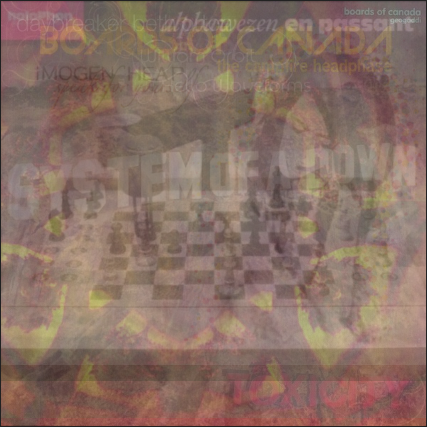
2005
Speak for Yourself - Imogen Heap
RUNNERS-UP
The Campfire Headphase - Boards of Canada
Blink the Brightest - Tracy Bonham
The Forgotten Arm - Aimee Mann
COMMENTS
This year both Bonham and Mann really outdid themselves in the songwriting department: Blink the Brightest equal in awesomeness to Burdens of Being Upright, and Forgotten Arm far surpassing any of Mann's previous releases. There is a maturity and refinedness to these two albums that is difficult to describe.
Imogen Heap outdid herself (and pretty much everyone else) as well, really coming into her own as multiinstrumental acoustic/electronic texturalist/songwriter extraordinare.
2006
Hello Waveforms - William Orbit
RUNNERS-UP
Army of Anyone (self-titled)
Soundcastles - Pretz
Trans Canada Highway - Boards of Canada
COMMENTS
Trans Canada Highway is an EP containing one of the best tracks from Campfire Headphase (Dayvan Cowboy) and four additional songs, and even though it is less than 20 minutes long the song quality - especially of the vignettes Heard from Telegraph Lines and Under the Coke Sign - is exceptionally high. Pretz' Soundcastles and William Orbit's Hello Waveforms are along similar ambient electronic lines; Pretz's being very organ-driven jazz-electronic and Orbit's being essentially the perfecting of his tasteful guitar-laden electronic reverie-inducing soundscapes.
Army of Anyone is a supergroup consisting of Filter's Richard Patrick on vocals, STP's DeLeo brothers on guitar and bass, and Ray Luzier on drums. Unlike you'd think, their sound ≠ STP+Filter. It is like all of the great singing, songwriting, and technicality of their origin bands but with a stylistic shift toward something more straightforward and immediate. It is very high-energy and awesome.
2007
Grow Up and Blow Away - Metric
RUNNERS-UP
The Bird and The Bee (self-titled)
Marry Me - St. Vincent
Horrible Oracle Blessedness - am-boy
COMMENTS
Although recorded in 2001 and intended as their debut, this album of Metric's was not released by their then-label, and what a mistake that was! Definitely my favorite Metric album (just edging out Fantasies). And this is the year of debuts apparently, as both The Bird and the Bee and St. Vincent released their firsts here.
2008
THREE-WAY TIE
Saturdays = Youth - M83
A Hundred Million Suns - Snow Patrol
Sirens of the Sea - Oceanlab
RUNNER-UP
All is Well - Sam Amidon
COMMENTS
M83's eightiesesque journey of nostalgic perfection, Oceanlab's one and only album showcasing the sirenlike voice of Justine Suissa, and Snow Patrol's masterpiece.
With every previous Snow Patrol album there is a track here or there that I skip (though there are so many great songs), and with the follow-up Fallen Empires the emotion and intensity seem too forced to be real. However, with A Hundred Million Suns they managed to get it just right.
2009
TWO-WAY TIE
Fantasies - Metric
Things You Should Know - Carina Round
RUNNER-UP
Ray Guns Are Not Just the Future
- The Bird and the Bee
COMMENTS
Things You Should Know is an EP that packs the punch of an entire album in just five songs. Seriously: tracks 1, 3, and 5 basically induce three separate religious experiences (and I'm not even a religious person). It is the perfect preamble to her Tigermending (2012), which will definitely be on the 2010s decade list.
I hope that this list helps you discover some album or band you've never heard before. It is always a blast to discover some musical gem of which one was previously unaware.
Lately I've been exploring the metal genre, hence the SOAD entries in 2001/2002. But I am pretty picky about metal because I do not really like the non-melodic growling that most metal singers stick to. One of my favorite metal albums is Fair to Midland's Arrows & Anchors (2011) because it incorporates multiple genres, complex melodies, and intricate songwriting.
Been checking out TesseracT a bit as well but don't know if I like them yet. If you know of any other good metal bands with actual melodic singing I would definitely appreciate any recommendations.
Home | Books | Music | Sci-Fi | Works
Published on May 24, 2020 12:58
March 13, 2017
Stories and Essays in Paperback
Stories and Essays, a collection of science fiction short stories and philosophical essays is now available in paperback!
(skip wordy intro and go straight to book info)
About a month ago Kindle Direct Publishing announced an extension to their eBook publishing platform which enables paperback publishing. I had been wanting to publish a paperback version of Bivalent Logic for a long time so I jumped on the new program and found that it worked great. Their book file processing software in particular is highly useful. It enables you to download the actual .DOC file their print previewer is using (a .DOC file that is created by their software from whatever book file you originally uploaded), edit the .DOC file yourself to make it look perfect, and re-upload it for re-processing. And even better, if you have the ability to generate PDFs from .DOC files you can edit the .DOC, generate its PDF and re-upload that instead, that way whatever changes you make will be transferred directly into their print-ready file.
So after publishing Bivalent Logic I went ahead and did Coincidental Repertoire too because the process was so pain free. And I would have stopped there, but then I realized that I had a book's worth of digital-only material waiting in the wings for the chance of print.
In particular the science fiction short stories Dual Void and IHU and the essay On the Preservation of Enthusiasm. Along with these I have included four additional essays, ten flash fiction fables, and over forty journal excerpts. The stories as well as the essays deal with fundamental questions of existence, the universe, consciousness, ultimate reality, epistemology, metaphysics, and ethics.
Complete contents are listed below as well as on the Stories and Essays official webpage.
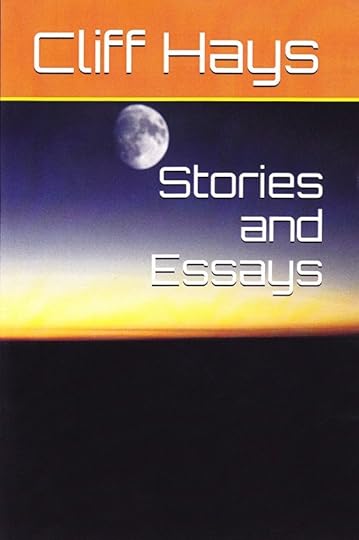
Paperback: 112 pages
Language: English
ISBN-10: 1520758596
ISBN-13: 978-1520758596
Dimensions: 6 × 0.3 × 9 in
Shipping Weight: 7.8 oz
Order Stories and Essays at:
Amazon.com
Amazon United Kingdom
Amazon Deutschland
Amazon España
Amazon France
Amazon Italia
Amazon Japan
Add Stories and Essays to
your Goodreads library at
goodreads.com/cliffhays
Read samples from
Stories and Essays on
cliffhays.weebly.com
Table of Contents:
1. Dual Void (Short Story, 2013)
2. On the Preservation of Enthusiasm (Essay, 2013)
3. On the Existence of God and Evil (Essay, 2016)
4. Harmony In Contrast (Essay, 2005)
5. IHU (Short Story, 2004)
6. The Trolley Problem (Essay, 2012)
7. Anselm's Ontological Argument (Essay, 2012/2017)
8. Flash Fiction Fables (Small Stories, 2003)
9. Journal Excerpts (2004-2010)
Home | Books | Philosophy | Music | Sci-Fi | Works
Published on March 13, 2017 10:17




